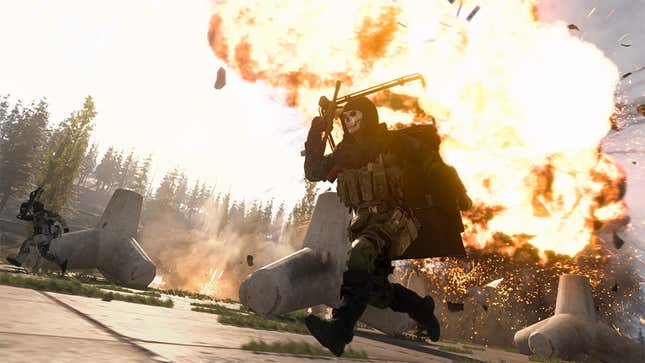
I can’t fully express how little I care about Call of Duty: Warzone or any leaks thereof. What I do love, however, is giant gaming conglomerates making fools of themselves, and Activision Blizzard really stepped in it this morning when it used draconian copyright law to try to cover up a trivial news story about the battle royale game’s first map being revamped.
Over the last 24 hours, several sources have leaked footage of a new 1980s-inspired update for Verdansk, Call of Duty: Warzone’s main battleground, but you won’t find it on social media. Activision has done everything it can to remove videos and screenshots by way of Digital Millennium Copyright Act (DMCA) warnings, even going so far as having Twitter take down tweets by news site Video Games Chronicle and its editor-in-chief Andy Robinson.
As Robinson himself noted, it really only confirms the details Activision’s lawyers worked so hard to bury.
This is what’s known as the “Streisand effect,” a term coined in 2005 to explain the internet-age phenomenon wherein trying to hide discrediting, embarrassing, or otherwise not-meant-for-public-consumption information only results in its proliferation. Activision, by reacting so heavy-handedly, turned details that barely qualify as news to begin with into one of today’s hot topics.
And it’s not like Activision doesn’t have enough on its plate already. Despite record profits leading to cushy bonuses for CEO Bobby Kotick, the corporation has steadily whittled down its global workforce with widespread layoffs. Earlier this year, Activision lawyers told the U.S. Securities and Exchange Commission that interview diversity requirements were “unworkable” before going on to hire both a Bush-era torture apologist and a Trump administration member described as a “bully” and “attack dog” to high-level positions last month.
VGC’s Andy Robinson has since said he’s been in contact with someone at Activision, who apparently clarified the decision to DMCA him and his website, and he says he’s satisfied with whatever outcome the two parties came to. While certainly unnerving, Robinson seems to have taken the whole thing on the chin, and has even used the warning to cheekily promote a separate VGC story about E3.
In the end, one has to wonder what exactly was accomplished.